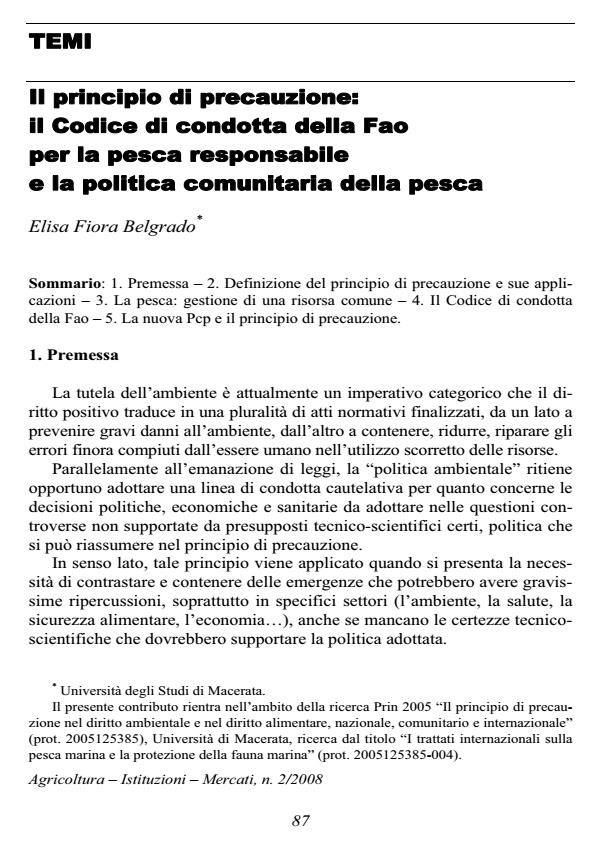Il principio di precauzione: il Codice di condotta della Fao per la pesca responsabile e la politica comunitaria della pesca
Titolo Rivista AGRICOLTURA ISTITUZIONI MERCATI
Autori/Curatori Elisa Fiora Belgrado
Anno di pubblicazione 2009 Fascicolo 2008/2
Lingua Italiano Numero pagine 20 P. 87-106 Dimensione file 126 KB
DOI 10.3280/AIM2008-002005
Il DOI è il codice a barre della proprietà intellettuale: per saperne di più
clicca qui
Qui sotto puoi vedere in anteprima la prima pagina di questo articolo.
Se questo articolo ti interessa, lo puoi acquistare (e scaricare in formato pdf) seguendo le facili indicazioni per acquistare il download credit. Acquista Download Credits per scaricare questo Articolo in formato PDF

FrancoAngeli è membro della Publishers International Linking Association, Inc (PILA)associazione indipendente e non profit per facilitare (attraverso i servizi tecnologici implementati da CrossRef.org) l’accesso degli studiosi ai contenuti digitali nelle pubblicazioni professionali e scientifiche
The Principle of Precaution: the FAO Code of Conduct for Responsible Fisheries and Common Fisheries Policy - "From ancient times, fishing has been a major source of food for humanity and a provider of employment and economic benefits to those engaged in this activity. The wealth of aquatic resources was assumed to be an unlimited gift of nature. However, with increased knowledge and the dynamic development of fisheries after the Second World War, this myth has faded in face of the realization that aquatic resources, although renewable, are not infinite and need to be properly managed, if their contribution to the nutritional, economic and social well-being of the growing world’s population is to be sustained" (Fao Code of Conduct for Responsible Fisheries - Preface). Thus fishing has to be conducted in a responsible and sustainable manner because fish provides a vital source of food and, at the same time, fishing is closely connected to the environment because, if it is not properly practised can it cause irreparable damage. This work analyses the principle of precaution which was recognized as principle no. 15 in the Declaration of Rio on Environment and Development in 1992 and mentioned at the Conference on Biological Diversity. It represents one of the fundamental principles of the Fao Code of Conduct for Responsible Fisheries and Common Fisheries Policy (Regulation (EC) No 2371/2002 of 20 December 2002). States should apply a precautionary approach choosing the best measures and policy, taking into account the latest scientific evidence available. The aim is «to protect and conserve living aquatic resources, to provide for their sustainable exploitation and to minimise the impact of fishing activities on marine eco-systems.» (article 2 Regulation (EC) No 2371/2002).
Parole chiave: scienza, protezione, precauzione, pesca, sviluppo.
Key words: Science, Protection, Precaution, Fishing, Development.;
Elisa Fiora Belgrado, Il principio di precauzione: il Codice di condotta della Fao per la pesca responsabile e la politica comunitaria della pesca in "AGRICOLTURA ISTITUZIONI MERCATI " 2/2008, pp 87-106, DOI: 10.3280/AIM2008-002005